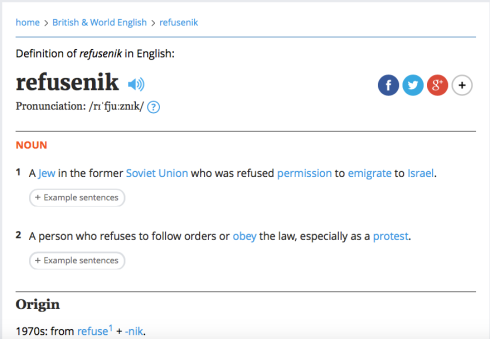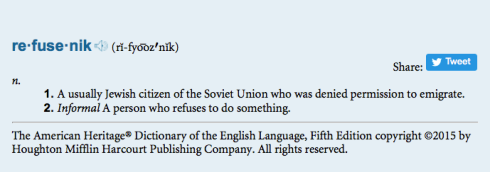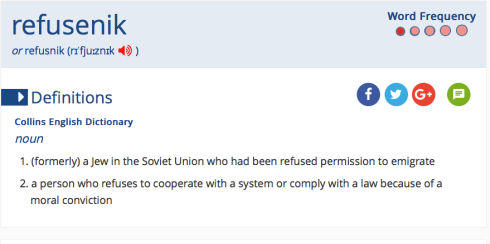For a moment, I wasn’t entirely clear what was being corrected here:

Was this going to be a discussion about “refusenik”? In fact, it soon becomes clear that it isn’t: the quote is merely provided as context to explain why the non-standard noun “copyrighters” has become confused with “copywriters”. But perhaps we do need to talk about “refusenik”; because current usage is moving it rapidly away from what it used to mean.
“-nik”, (“-ник”), as imported from Russian and added to the end of English words, has become a gloriously compact morpheme for creating agent nouns (as well as a way of adding an implied hint or criticism about the subject’s politics): beatnik, peacenik, no-goodnik. But it’s so compact that it actually leaves the precise relationship between the noun and the agent unclear. A beatnik is someone enraptured by the Beat movement; a peacenik is a proud pacifist. Similarly, a “refusenik” is now someone who chooses to boycott something as a protest. But historically, the word meant something very different.
The original term, “отказник” (“otkaznik”), was applied to minorities in Cold War Russia – often Soviet Jews – who were being denied permission to leave the USSR and emigrate (in the Soviet Jews’ case, to Israel; in the case of other minorities, to join diasporas or seek asylum on religious grounds). The policy, which prompted an international human rights dispute, came to a head for several years in the late 1960s and early 1970s before bans were lifted for a period. So the original refuseniks were not people who had refused to do something; they were people to whom something had been refused; would-be refugees who were being prevented from travelling to any other country. They were victims of refusal, not proponents of it.
In these post-Soviet days, that usage is rarely heard. Many of the major dictionaries still record it, for example, Oxford, American Heritage and Merriam-Webster –



– but Collins already describes the original, political meaning as the “former” definition:

and it’s clear that a word that could once have been a synonym for “detainee” is now well on the way to being a synonym for “dissident”.
Usage has radically changed the word’s meaning and laundered it, willy-nilly, of its political gravity and history. One might feel that this has not been language-change’s finest hour, although the compressed ambivalence of “-nik” as a suffix probably made some confusion inevitable. Now, as is the case with “enormity”, the new meaning of “refusenik” has overwritten the old to such an extent that it’s no longer safe to assume the original usage will be understood.
But it can still be jarring to see the new meaning employed in text. And of course, one doesn’t have to use it; one can probably be a refusenik – I mean a dissident – about that for a while longer.

